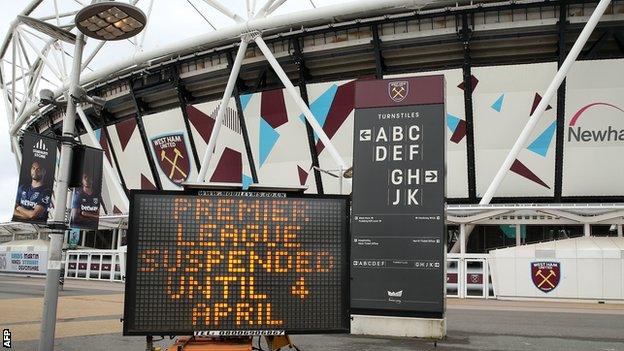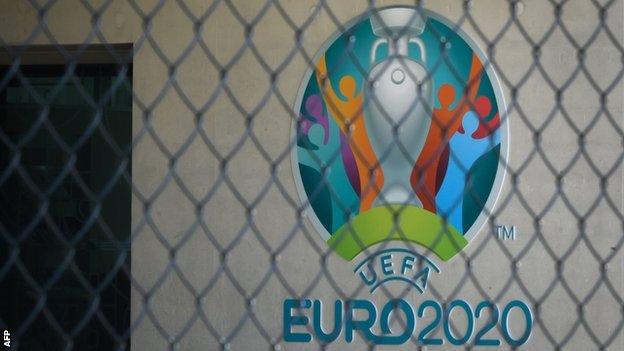Coronavirus: Football industry 'could turn ugly quickly', says Fifpro general secretary
- Published

Elite level football in England was cancelled on 13 March
The football industry could "turn ugly quickly" as it struggles to come to terms with the coronavirus impact, said Jonas Baer-Hoffman, general secretary of world players' union Fifpro.
Hoffman was on the first of today's three conference calls that resulted in Euro 2020 being moved back a year.
Fifpro welcomed the move, saying it gave a chance to complete the club season, which is an economic priority.
But Hoffman is worried that, with no timeframe for when games will start again in Europe's major leagues, football will not be able to cope financially with a long period with no action.
"For the first time in decades, we're facing a real, consistent economic crisis in the industry," he said.
Hoffman added: "We must look at the socio-economic impact of coronavirus.
"Not just the players but other people employed through professional football - our industry employs hundreds of thousands. There is the potential for it to turn ugly very quickly.
"For the majority of our membership, male and female, the loss of income is as threatening as for any other worker and we are getting the first messages of lay-offs of players, withholding of wages and clubs being threatened.
"We know how football clubs budgets are managed. They're always right at the line or above it in terms of liquidity.
"If we don't respond quickly in terms of stabilising the cash flow we could see mass redundancies and mass lay-offs of players and other staff within weeks.
"In Ireland or the Nordic countries we have the first measure being taken that could affect the employment of players. Once those jobs are gone and those clubs are bankrupt, it is difficult for them to recover once coronavirus is over."
Fifpro are talking to Uefa and world governing body Fifa as a matter of urgency, aiming to secure short-term loans or grants, or secure future payments not due.
While this is the priority, there is the knowledge that once the game starts again, the need to make up for lost time will be huge.

Euro 2020 will now take place from 11 June to 11 July, 2021
In moving Euro 2020, Uefa have created space for the club game to end its competitions - as yet, no-one is seriously considering abandoning them.
Yet the desire is to finish the current campaign at the end of June, start the next one a few weeks later and then tag Euro 2020 on the end.
"What's clear is when we do start it will be an incredibly tight schedule," said Hoffman.
"We know how big a problem we have with the calendar when it comes to player welfare. In this scenario, the stress will be on the players.
"We will have tough conversations about when to play which matches and it will have to be managed, but the players are realising that unless we find solutions and play out the seasons, they might be out of work."
Fifpro have opened negotiations with Fifa about the difficulty of seasons running beyond the end of June and how that will work given most contracts expire at the end of May and June. One idea is emergency contract extensions that run for another couple of months, with a ban on players being transferred during that time.
However, all planning is for a season that is hypothetical.
"None of us know when our lives will be normal again - and putting 50,000 people in a stadium will not be the first thing we do," said Hoffman.
"When people do start going back to work, players won't be able to walk out of their apartments straight on to the pitch and play football. There will need to be time to get them back on their feet."